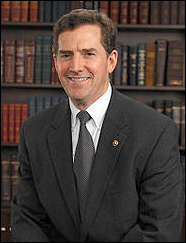We’re learning more about the eight outstanding House races, and one thing is clear: The trends that so favored the Democrats on Election Day are continuing in political overtime.

Rep. Mary Bono Mack (R-CA-45)
Rep. Mary Bono Mack
Congresswoman Bono Mack who succeeded her late husband in Congress, Rep. Sonny Bono upon his untimely death in early 1998, conceded her re-election contest to physician Raul Ruiz on Saturday in California’s Riverside County/Palm Desert region. The current results, which continue to evolve because California non-Election Day votes are still being counted, put the eight-term congresswoman 7,336 votes behind Ruiz. Such a deficit is too large to overcome considering the number of outstanding votes, hence her decision to concede.
The new 36th District contains 75% of the territory from Ms. Bono Mack’s current 45th District and actually became two points more Republican in redistricting, but this year’s Democratic political tide was too much for her to overcome.
Reps. Dan Lungren & Brian Bilbray
In northern California, at the end of counting on Friday, Rep. Dan Lungren (R-CA-7) had fallen further behind his challenger, physician Ami Bera (D). Trailing by just 184 votes on Election Day, Lungren now faces a 1,779 vote deficit with still more than 70,000 ballots remaining.
In the San Diego area, we find a similar trend. There, San Diego Port Commission chairman and ex-City Councilman Scott Peters has extended his lead over Rep. Brian Bilbray (R-CA-52) to 1,334 votes. Approximately 80,000 ballots remain to be counted. With such large pools of ballots still remaining, anything can still happen in both of these districts, but clearly the first reported non-Election Day counts favor the Democrats in both districts.
Rep. Allen West
Turning to southeast Florida, Rep. Allen West (R-FL-18) is encountering a different problem than awaiting a long ballot counting process, but he appears to be having at least a modicum of success in waging his voting irregularity argument. Virtually all of the ballots have been counted here — only those from the military and overseas remain — and West trails attorney Patrick Murphy (D) by 2,442 votes. The congressman’s claim concerns the tabulation of early votes in St. Lucie County. The original election night count gave West about a 1,700 vote lead. When St. Lucie County election officials decided to recount the early votes, based upon a reported technical glitch, the margin shifted by more than 4,000 votes in Murphy’s favor. On Friday, a local judge ordered the 37,000+ St. Lucie County early votes to be recounted. The crux of the West argument is that some of the early votes were double-counted with those cast on Election Day.
Arizona
Counting continues in two undecided Arizona congressional districts. In the tight 2nd District, Rep. Ron Barber (D), who won his seat in a June special election, for the first time leads former Gulf War veteran Martha McSally (R). When counting ended Friday, Barber had taken a 289-vote lead. There could still be as many as 40,000 ballots to count. In the new 9th District, Democrat Kyrsten Sinema continues to lead Republican Vernon Parker, as she has virtually from the beginning. With tens of thousands of ballots remaining, Sinema’s lead has now increased to a substantial 4,710 votes.
Rep. Mike McIntyre
In North Carolina’s 7th District, the re-count trend has favored Republican David Rouzer in his quest to unseat Rep. Mike McIntyre (D). With the counting process continuing, McIntyre’s lead is now down to 394 votes. The final tally is due to be reported on Nov. 16th. Since it is almost a certainty that the end result will fall within a 1% margin, a full recount will be ordered in compliance with state election law. This result will likely hang in limbo for several more weeks.
Rep. Jim Matheson
Counting also continues in Utah’s close 4th Congressional District race even though Republican challenger Mia Love has already conceded to Rep. Jim Matheson (D-UT-4). The congressman’s margin in 2,646 votes, and an eventual Matheson victory will be the final official result.
Florida
Turning to the one outstanding state in the presidential contest, Florida election officials have declared Pres. Barack Obama the winner of the Sunshine State vote, meaning the final Electoral College margin is 332-206 in the president’s favor.
Washington
The one remaining Governor’s race has also been decided. Former Rep. Jay Inslee (D-WA-1) has been declared the winner of the Washington gubernatorial race, defeating Attorney General Rob McKenna (R) 51-49%.










